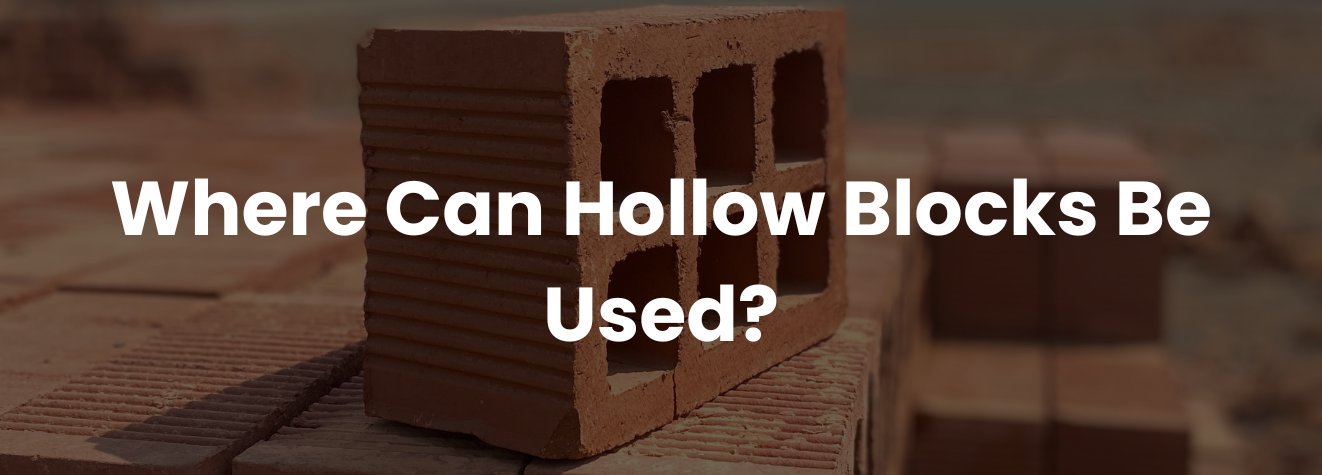Hollow blocks are among the most widely used construction materials in the world, prized for their versatility, durability, and cost-effectiveness. These blocks, made from concrete or cement, are hollowed out to reduce weight and materials without compromising strength. They come in various sizes and types, making them suitable for a wide range of construction applications. In this blog, we’ll explore the numerous ways hollow blocks can be used, discuss the advantages they offer, and highlight how Building Bricks India, a leading manufacturer, can meet your hollow block needs.
Applications of Hollow Blocks in Construction
1. Residential Buildings
Hollow blocks are extensively used in residential construction, particularly in building walls, foundations, and partitions. Their lightweight nature makes them easy to handle, reducing labor costs and construction time. Additionally, hollow blocks provide excellent thermal insulation, which helps maintain a comfortable indoor temperature, reducing the need for artificial heating or cooling. This makes them an ideal choice for homes in both hot and cold climates.
2. Commercial Buildings
In commercial construction, where large-scale projects demand efficiency and durability, hollow blocks are a popular choice. They are used in constructing office buildings, shopping malls, and industrial facilities. The blocks’ hollow cores can be filled with reinforcing materials like steel rods and concrete, enhancing the structural strength and load-bearing capacity of the buildings. Moreover, hollow blocks can be produced in various sizes to accommodate specific project requirements, making them a versatile option for architects and builders.
3. Boundary Walls and Fences
Hollow blocks are also commonly used in constructing boundary walls and fences. Their robust nature ensures that these structures are durable and long-lasting, while the hollow spaces within the blocks allow for the integration of additional reinforcement. This makes hollow blocks an excellent choice for securing property perimeters in residential, commercial, and industrial settings.
4. Retaining Walls
Retaining walls are crucial in landscaping and civil engineering, helping to hold back soil and prevent erosion. Hollow blocks are an ideal material for building retaining walls due to their strength and stability. The hollow cores of the blocks can be filled with concrete to increase the wall’s weight and stability, ensuring it can withstand the pressure exerted by the soil.
5. Sound and Fireproofing
Hollow blocks are known for their soundproofing and fire-resistant properties, making them suitable for constructing walls in areas where these characteristics are essential. For instance, they are often used in schools, hospitals, and residential complexes to reduce noise pollution and enhance safety. The air pockets within the blocks act as insulators, minimizing sound transmission and providing an additional layer of protection against fire.
6. Road and Pavement Construction
In road construction, hollow blocks are used for creating pavements, footpaths, and other similar structures. Their durability and ability to withstand heavy loads make them an ideal choice for areas with high foot traffic or vehicular movement. Hollow blocks can also be used to construct culverts and drainage systems, contributing to the infrastructure’s overall stability and longevity.
7. Garden Landscaping
For garden landscaping, hollow blocks offer a practical and aesthetically pleasing solution. They can be used to create garden walls, planters, and other decorative structures. The blocks can be arranged in various patterns and filled with soil to grow plants, adding a natural and organic touch to the landscape. Their ease of installation and versatility make them a favorite among landscapers and DIY enthusiasts.
Benefits of Using Hollow Blocks
1. Cost-Effective
One of the primary advantages of using hollow blocks is their cost-effectiveness. The reduced weight of the blocks means that less material is required for production, leading to lower manufacturing costs. Additionally, the ease of installation reduces labor expenses, making hollow blocks an economical choice for construction projects of all sizes.
2. Energy Efficiency
Hollow blocks contribute to energy efficiency by providing excellent thermal insulation. The air pockets within the blocks act as barriers to heat transfer, helping to keep indoor spaces cool in summer and warm in winter. This reduces the need for heating and cooling systems, leading to significant energy savings over time.
3. Environmentally Friendly
The production of hollow blocks is environmentally friendly, as it requires fewer raw materials and generates less waste compared to solid blocks. Additionally, the energy efficiency provided by hollow blocks helps reduce the overall carbon footprint of buildings. Some manufacturers, like Building Bricks India, also offer hollow blocks made from recycled materials, further enhancing their environmental benefits.
4. Durability and Strength
Despite being lighter than solid blocks, hollow blocks are incredibly durable and strong. When properly reinforced, they can withstand heavy loads and harsh environmental conditions, making them suitable for both load-bearing and non-load-bearing walls. The longevity of hollow blocks ensures that structures built with them remain stable and secure for decades.
5. Flexibility in Design
Hollow blocks come in various sizes and shapes, offering flexibility in design and construction. Builders and architects can choose from different block sizes to meet specific project needs, whether it’s for a small residential home or a large commercial complex. This versatility allows for creative and innovative architectural designs, enhancing the aesthetic appeal of buildings.
6. Fire Resistance
Hollow blocks are naturally fire-resistant, offering an additional layer of safety to buildings. The blocks can withstand high temperatures without losing their structural integrity, making them an ideal choice for fire-prone areas. This characteristic also contributes to the overall safety of residential and commercial buildings.
Understanding Hollow Blocks: Size, Price, and Best Practices
When selecting hollow blocks for your construction project, it’s essential to consider the size and price. Hollow blocks are available in various sizes, typically ranging from 4 inches to 12 inches in width. The choice of size depends on the specific requirements of your project, such as the thickness of walls or the load-bearing capacity needed.
The price of hollow blocks can vary based on factors like size, material, and the manufacturer. On average, hollow blocks are more affordable than solid blocks due to the reduced material usage. However, prices may differ across regions and suppliers, so it’s advisable to compare prices from multiple sources before making a purchase.
For those looking for the best hollow blocks, it’s crucial to choose a reputable manufacturer that adheres to quality standards and offers a range of sizes to meet your needs.
Choose Building Bricks India for Your Hollow Block Needs
If you’re in the market for high-quality hollow blocks, look no further than Building Bricks India. As a leading manufacturer of construction materials, Building Bricks India is committed to providing the best hollow blocks in the industry. With a wide range of sizes and competitive prices, they cater to all types of construction projects, from residential to commercial.
Building Bricks India’s hollow blocks are made from premium materials, ensuring durability, strength, and long-lasting performance. Whether you’re building a home, office, or garden structure, you can trust Building Bricks India to deliver the best hollow blocks at the most competitive prices. Visit their website or contact them today to learn more about their products and how they can help you achieve your construction goals.




